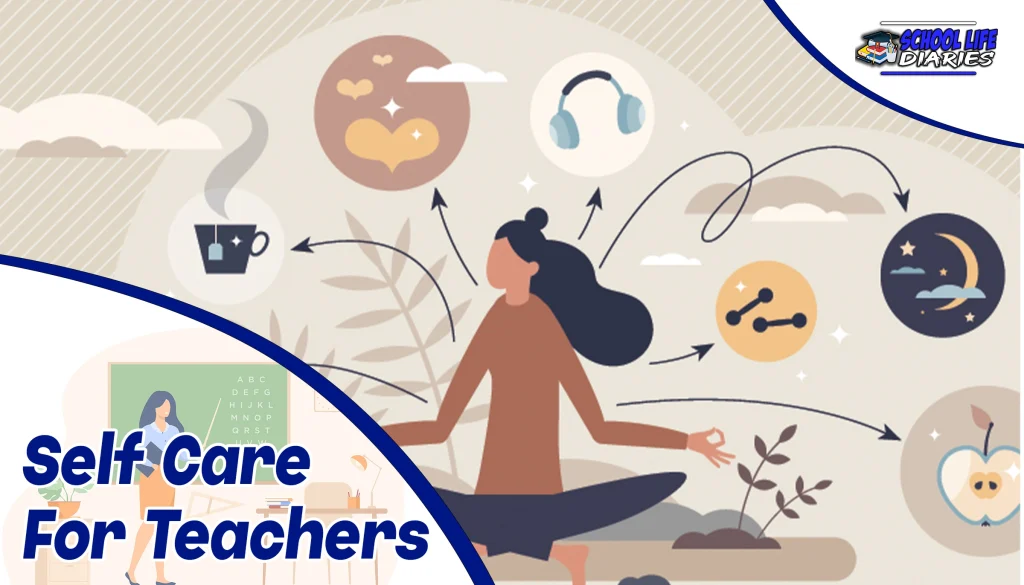As a teacher, self-care for teachers is probably the last thing on your mind you’re responsible for preparing lesson plans, teaching classes, and caring for your students. You undoubtedly put in long hours to ensure that everything on your plate gets done.
Despite this, devoting time to yourself is an essential part of maintaining mental and physical health and should not be discounted or overlooked. Taking care of yourself allows you to better take care of others around you.
In this blog post, we’ll discuss strategies for successfully prioritizing self-care in your life as a busy teacher.
What Is Self-Care?
Self-care is an important practice for individuals to take part in on a regular basis. It encompasses any behavior that helps one to maintain their mental and physical health, as well as their level of well-being.
Examples of self-care behaviors can include getting quality sleep, developing healthy eating patterns, taking time for yourself to relax, engaging in physical activities, and taking part in social activities. In addition to these physical practices, self-care can also encompass emotional well-being and mental health care.
This means making sure to practice positive self-talk and actively challenge your own thoughts if they are negative or unhelpful. It may also involve treating yourself with kindness and acceptance, as well as finding outlets.
Why Is Teacher Self-Care Important For A Teacher?
Teacher self-care is an essential part of being an effective and successful educator. Teachers are responsible for providing students with a safe, nurturing, and stimulating environment in which to learn and grow.
That’s why it’s so important to make sure you are actively engaging in self-care practices that will help recharge your batteries and keep you energized throughout the school year.
Without proper self-care, teachers can quickly become overwhelmed with the demands of their job and experience burnout, leading to decreased productivity, decreased job satisfaction, and an overall lack of enthusiasm for teaching.
How To Practice Self-Care For Teachers In Your School?
Practicing self-care in school is essential for helping students stay focused and motivated. Self-care has been linked to better academic performance, improved relationships, and overall well-being.
To practice self-care in school, students can start by developing a plan that works for them. Here are some tips for incorporating self-care into a school routine:
1. Get enough sleep:
Lack of sleep can affect cognitive abilities, so it’s important to get plenty of rest. Establish a regular bedtime and wake-up time each day and stick to it as much as possible.
2. Make time for physical activity:
Exercise has been linked to better mental health, so take time during the day to get moving and release tension.
3. Eat healthy meals and snacks:
Eating nutritious foods can help fuel your body and mind for a productive day in school.
4. Take brief mental breaks throughout the day:
Taking small breaks throughout the day allows you to recharge your battery and return to tasks with a fresh perspective.
5. Avoid distractions that take away from schoolwork:
Turn off the television and avoid social media while studying or completing assignments.
6. Break big tasks:
Break big tasks into smaller ones and start with the most important assignments first. This will help you stay focused and motivated throughout your day.
7. Manage stress levels:
Taking deep breaths, meditating, and finding ways to relax can help you stay on top of stress.
8. Get plenty of sleep:
Make sure to get seven to eight hours of sleep each night so that you can wake up feeling refreshed and ready to take on the day.
Related Article: Should Teachers Be Allowed to Touch Students?
Top 10 Tips For Teacher Self-Care
1. Practice healthy habits:
Taking care of your physical health is essential for your overall well-being. Engage in regular exercise, eat nutritious meals, and get enough sleep.
Prioritizing self-care in these areas helps to maintain energy levels, reduce stress, and promote a positive mindset, enabling you to show up as your best self in the classroom.
2. Make time for activities that soothe your stress:
Engaging in activities that bring you joy and help you unwind is crucial for teacher self-care. Whether it’s reading a book, listening to music, practicing a hobby, or simply spending time in nature, find activities that help you relax and recharge. Carving out dedicated time for these activities allows you to alleviate stress and cultivate a healthy work-life balance.
3. Take breaks:
It’s easy for teachers to get caught up in the demands of the job and neglect taking breaks. However, regular breaks throughout the day are essential for recharging your mental and emotional energy.
Use your break time to step away from your work area, stretch, take a short walk, or engage in mindfulness practice. These moments of respite help to refresh your mind, improve focus, and prevent burnout.
4. Establish Boundaries:
Setting clear boundaries between work and personal life is vital for teacher self-care. Define specific times for work-related tasks and designate time for personal activities. Avoid bringing work home whenever possible and limit after-hours communication.
By establishing boundaries, you create space for self-care, relaxation, and rejuvenation outside of your professional responsibilities.
5. Find a Support System:
Surrounding yourself with a supportive network of colleagues, friends, and family can greatly contribute to your well-being. Share your challenges and triumphs with others who understand the teaching profession and can provide guidance, empathy, and encouragement.
Having a support system helps to alleviate stress, build resilience, and remind you that you’re not alone in your experiences.
6. Acknowledge moments of gratitude or joy:
In the midst of the daily demands of teaching, it’s important to intentionally recognize and appreciate moments of gratitude or joy. Reflect on positive interactions with students, meaningful accomplishments, or instances where you made a difference in a student’s life.
Focusing on these moments helps to boost morale, reinforce your passion for teaching, and cultivate a positive mindset.
7. Recognize what is and isn’t in your control:
Accept that there are aspects of teaching that are beyond your control, such as administrative decisions or external factors influencing the learning environment. Focus your energy on the aspects that you can control, such as your teaching methods, classroom environment, and personal well-being. Shifting your mindset to what you can influence empowers you to take proactive steps toward self-care and professional growth.
8. Hang out with non-work friends:
Building and nurturing relationships with friends who are not part of the teaching profession provides an opportunity to disconnect from work-related conversations and experiences.
Spending time with non-work friends helps you to maintain a balanced perspective, engage in diverse conversations, and enjoy activities outside of the educational realm.
9. Try meditation:
Incorporating mindfulness and meditation practices into your daily routine can be transformative for teacher self-care. Taking a few minutes each day to practice deep breathing, meditation, or guided relaxation exercises helps to calm the mind, reduce stress, and enhance overall well-being. Such practices promote self-awareness, emotional regulation, and a greater sense of inner calm.
10. Celebrate your classroom wins:
Take the time to acknowledge and celebrate your accomplishments as a teacher. Celebrating classroom wins, big or small, reinforces your dedication and the impact you have on your students’ lives.
Whether it’s recognizing a student’s progress, receiving positive feedback, or achieving a personal teaching goal, celebrate these milestones to boost motivation, self-confidence, and a sense of fulfillment.
Final Thoughts: Self-Care For Teachers
Self-care is not a luxury but a necessity for teachers to thrive in their profession. By implementing the self-care strategies discussed in this blog post, teachers can prioritize their well-being, manage stress, and prevent burnout.
Taking care of oneself is not selfish; it is an investment in one’s own health and the ability to provide the best support and education to students. Remember, you cannot pour from an empty cup.
Teachers play a vital role in shaping young minds, and by prioritizing self-care, they can continue to make a positive impact in the lives of their students.







